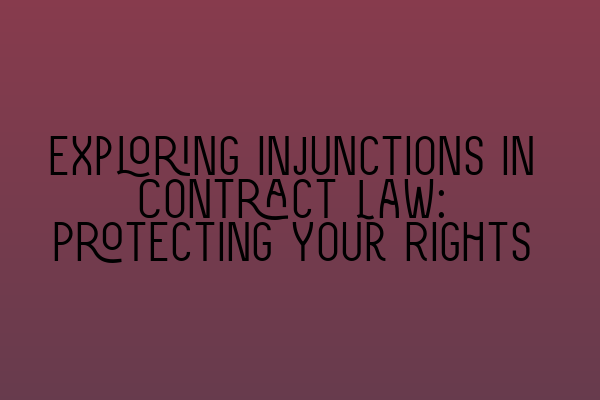Exploring Injunctions in Contract Law: Protecting Your Rights
When it comes to contract law, understanding your rights and remedies is essential. One powerful tool that can protect your interests and ensure compliance is an injunction. In this blog post, we will explore the concept of injunctions in contract law and how they can be utilized to safeguard your rights.
What is an Injunction?
An injunction is a court order that requires a party to do, or refrain from doing, a specific action. In the context of contract law, an injunction can be sought to prevent a party from breaching their contractual obligations or to compel them to fulfill those obligations. It is a valuable legal remedy that can be used to maintain the status quo, prevent irreparable harm, and enforce contractual agreements.
There are two main types of injunctions that can be sought in contract law:
- Prohibitory Injunction: This type of injunction restrains a party from performing a certain act. For example, if one party is planning to disclose confidential information in violation of a non-disclosure agreement, the injured party can seek a prohibitory injunction to prevent such disclosure.
- Mandatory Injunction: On the other hand, a mandatory injunction compels a party to perform a specific act. For instance, if a contractor fails to complete a construction project as agreed, the client may seek a mandatory injunction to require the contractor to fulfill their contractual obligations.
Both types of injunctions can be essential in contract disputes, as they provide an effective means of ensuring that parties comply with their contractual commitments.
When Can an Injunction be Granted?
An injunction is not automatically granted by the court. The party seeking an injunction must satisfy certain criteria and demonstrate that:
- They have a valid underlying contract;
- There is a breach or imminent breach of that contract;
- Legal remedies are inadequate or insufficient to rectify the breach; and
- The granting of an injunction is just and fair in the circumstances.
If these criteria are met, the court has the discretion to grant an injunction. It is important to note that the court will consider factors such as the potential harm to the party seeking the injunction, the balance of convenience, and the overall interests of justice before making a decision.
The Process of Obtaining an Injunction
Obtaining an injunction in contract law involves several stages:
- Preliminary Assessment: The party seeking an injunction must consult with a solicitor who will assess the merits of the case and advise on the likelihood of success. It is essential to gather all relevant evidence and documentation to support the application.
- Pre-action Steps: Before applying to the court, the party seeking an injunction must typically engage in pre-action steps, such as sending a formal letter of demand to the breaching party. This showcases an attempt to resolve the dispute amicably before resorting to legal proceedings.
- Formal Application: The solicitor will prepare the necessary legal documents, including an application for an injunction, which will be filed with the court. The application must clearly state the grounds for seeking the injunction and provide supporting evidence.
- Interim Hearing: In urgent cases, an interim hearing may be conducted to determine whether a temporary injunction should be granted to maintain the status quo until a full hearing can take place. The court will assess the urgency, potential harm, and the balance of convenience in deciding whether to grant interim relief.
- Full Hearing: If the court grants interim relief, a full hearing will be scheduled to determine whether a permanent injunction should be granted. This hearing provides an opportunity for both parties to present their arguments and evidence to the court.
- Judgment and Enforcement: Following the full hearing, the court will make a final decision on whether to grant a permanent injunction. If granted, the breaching party will be legally bound by the court’s order. Failure to comply with the injunction can result in serious consequences, including contempt of court proceedings.
It is crucial to seek professional legal advice from a solicitor experienced in contract law to navigate the complex process of obtaining an injunction and to present a strong case before the court.
Conclusion
Injunctions play a vital role in contract law, providing parties with a powerful tool to protect their rights and ensure compliance with contractual obligations. Whether through a prohibitory injunction to prevent a breach or a mandatory injunction to compel performance, an injunction can be a highly effective remedy.
If you find yourself in a contractual dispute or facing a breach of contract, it is crucial to consult with a solicitor who specializes in contract law. They can guide you through the process, assess the merits of your case, and provide the necessary legal representation to pursue an injunction if appropriate.
For more information on related legal topics, check out the following articles:
- Unveiling Real-Life Case Studies: Insights into Legal Practice and Decision-Making
- Exploring Solicitor Salaries in the UK: Average Earnings and Factors Affecting Income
- Mastering Client Relationship Management: Skills for Solicitors to Enhance Trust and Loyalty
- Pursuing a Law School Education in the UK: Choosing the Right Path for Your Future
- Securing Training Contracts: A Roadmap to Becoming a Solicitor
